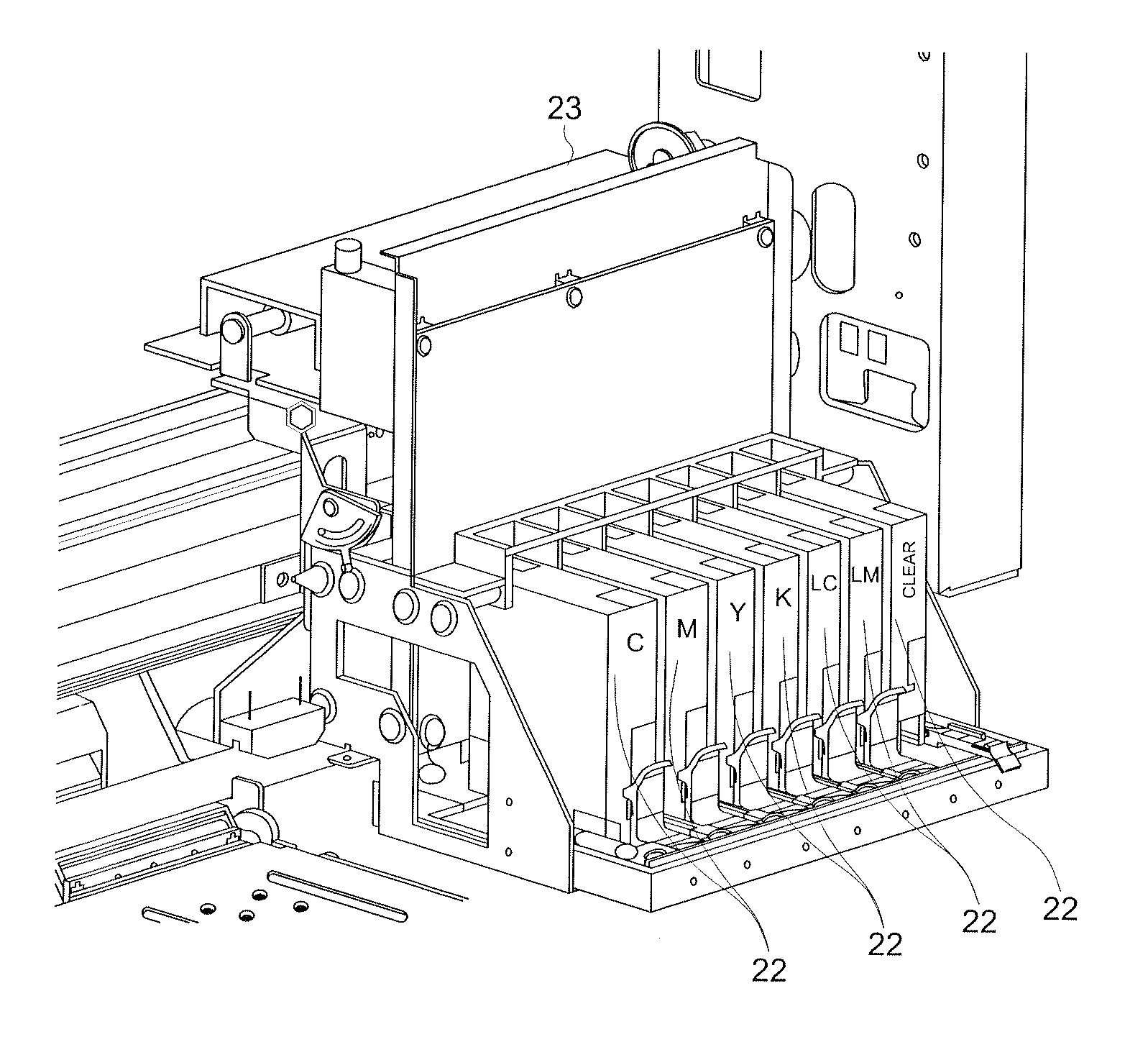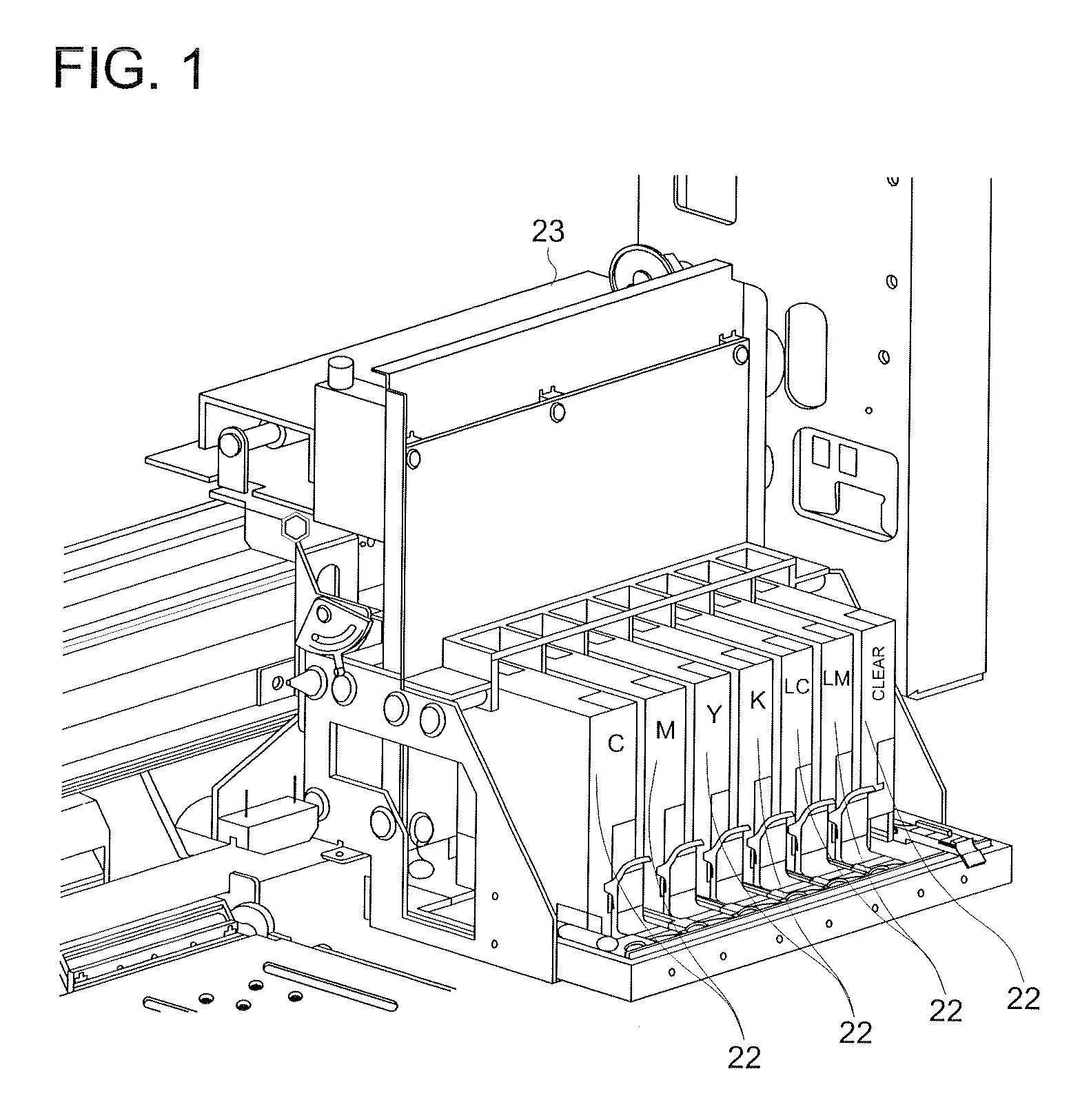Ink-jet image forming method
a technology of image forming and inkjet printing, which is applied in the direction of inks, coatings, instruments, etc., can solve the problems of image storage stability, image fading, image storage stability, etc., and achieve excellent weather resistance, high density, and high gloss.
- Summary
- Abstract
- Description
- Claims
- Application Information
AI Technical Summary
Benefits of technology
Problems solved by technology
Method used
Image
Examples
example 1
Preparation of Ink Set (Ink Composition)
Preparation of Ink Set 1
Preparation of Color Ink Set 1
[0223] Color Ink Set 1 was prepared as follows. Color Ink Set 1 was composed of six colors of Dark Inks of Yellow Ink (Y), Magenta Ink (M), Cyan Ink (C), and Black Ink (K), and Light Inks of Light Magenta Ink (Lm), and Light Cyan Ink (Lc). After each ink was mixed as follows, pH was adjusted within the range of 9.0±0.3 by dripping of triethanolamine. Subsequently, the ink was filtered employing a 3 μm membrane filter, and transferred into an empty cartridge. Preparation of Dark Color Ink: Yellow Ink (Y)
Dye: Direct Yellow 863.0weight %Diethylene glycol13weight %Glycerine10weight %Triethylene glycol monobutyl ether5.0weight %Microscopic resin particles1.5weight %[SX105A: produced by Zeon Corp.,being a styrene-butadienecopolymer resin (namely asanion modified latex), exhibitingTg of 0° C., an averageparticle diameter of109 nm] (in solidcontent equivalent)Surface active agent (Surfynol1...
example 2
Preparation of Ink Set
Preparation of Ink Sets 6-14
[0284] Ink Sets 6-14 were prepared in the same manner as preparation of Ink Set 1 described in Example 1, except that the microscopic resin particles [being SX1105A, produced by Zeon Corp., and being a styrene-butadiene copolymer resin (anionic modified latex), exhibiting a Tg of 0° C. and an average particle diameter of 109 nm] employed in Color Ink Set 1 and Clear ink 1, was replaced with each of the microscopic resin particles described in Table 2.
[0285] In addition, the details of each type of microscopic resin particle, described in Table 2 with abbreviated names, is shown below.
[0286] SF 300: an anionic modified urethane resin, exhibiting a Tg of −42° C. and an average particle diameter of 91 nm, produced by Dai-Ichi Kogyo Seiyaku Co., Ltd.
[0287] SR 110: an anionic modified styrene-butadiene copolymer resin, exhibiting a Tg of −27° C. and an average particle diameter of 116 nm, produced by Nippon A&L Inc.
[0288] A 2510: ...
example 3
Preparation of Ink-Jet Recording Medium
Preparation of Recording Medium 7
Preparation of Outermost Layer Coating Composition 1
[0297] Silica Dispersion Liquid 3 was prepared in the same manner as Silica Dispersion Liquid 1 described in Example 1, except that Cationic Polymer (P-1) was omitted. An aqueous solution containing this Silica Dispersion Liquid 3 at a solid content of 2%, polyvinyl alcohol (being PVP235, produced by Kuraray Co., Ltd.) at a solid content of 0.2%, and a surface active agent (being Olfine E1010, produced by Nisshin Chemical Industry Co., Ltd.) of 0.3% as an active ingredient, was prepared, and was designated as Outermost Layer Coating Composition 1.
Preparation of Recording Medium
[0298] Onto the 4th layer of the ink absorptive layer of Recording Medium 1 described in Example 1, pure water was provided to fill the voids with water, after which Outermost Layer Coating Composition 1, prepared as above, was applied employing a wire-bar method so that the soli...
PUM
| Property | Measurement | Unit |
|---|---|---|
| diameter | aaaaa | aaaaa |
| diameter | aaaaa | aaaaa |
| glass transition temperature Tg | aaaaa | aaaaa |
Abstract
Description
Claims
Application Information
 Login to View More
Login to View More - R&D
- Intellectual Property
- Life Sciences
- Materials
- Tech Scout
- Unparalleled Data Quality
- Higher Quality Content
- 60% Fewer Hallucinations
Browse by: Latest US Patents, China's latest patents, Technical Efficacy Thesaurus, Application Domain, Technology Topic, Popular Technical Reports.
© 2025 PatSnap. All rights reserved.Legal|Privacy policy|Modern Slavery Act Transparency Statement|Sitemap|About US| Contact US: help@patsnap.com



